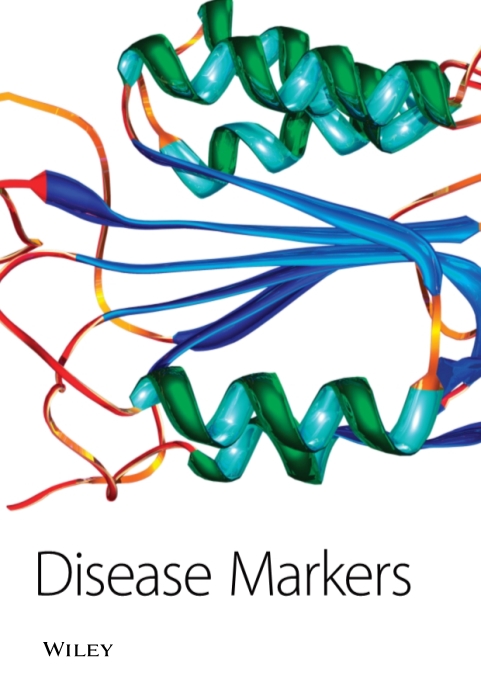利用 ROC 曲线确定肺癌肿瘤标记物筛查方法
4区 医学
Q3 Medicine
引用次数: 0
摘要
导言。肺癌在全球恶性肿瘤中排名第一,是导致男性和女性癌症相关死亡的主要原因。结合肿瘤标志物检测是筛查肺癌高危人群并最大限度降低肺癌死亡率的一种策略。因此,肿瘤标志物筛查至关重要。在本研究中,我们使用接收器操作特征曲线(ROC)分析方法对肺癌筛查中的肿瘤标志物组合进行了分析。方法:回顾性描述性研究利用中国葫芦岛市中心医院数据库2016年1月至2022年7月期间的数据,对确诊为肺癌的患者以及健康和良性肺部疾病患者进行回顾性描述性研究。采用t检验和ROC曲线评估单个肿瘤标志物和多个肿瘤标志物组合的有效性。肿瘤标志物是肿瘤组织代谢和分泌的分子产物,以细胞或体液为特征。它们可作为肿瘤分期和分级、监测治疗反应和预测复发的指标。研究结果在这项研究中,267 名健康参与者、385 名良性病变患者和 296 名肺癌患者接受了肿瘤标志物筛查。结果发现,五种肿瘤标志物--CEA、CYFRA21-1、NSE、pro-GRP 和 CA125--的敏感性为 55%。这项研究表明,单一肿瘤标志物在肺癌筛查中的价值有限。然而,将两种或两种以上的标记物结合在一起会产生不同的曲线下面积(AUC),对筛查准确性没有显著影响。在健康参与者中,CEA + CA125 组合的肺癌筛查准确率最高。当 CEA + CA125 的临界值为 0.447 时,该组合对肺癌筛查的灵敏度为 0.676,特异度为 0.846。相反,对于肺部良性病变患者来说,最佳组合是 CEA + NSE,临界值为 0.393,对肺癌筛查的灵敏度为 0.645,特异度为 0.766。结论五种肿瘤标志物--CEA、CA125、CY211、NSE、GRP--在筛查健康人和肺癌患者方面显示出良好的效果。然而,只有 CEA、NSE 和 GRP 能有效区分肺部良性病变和肺癌患者。单一肿瘤标志物在检测和筛查肺癌方面的作用有限,应与其他肿瘤标志物结合使用。CEA + CA125 是区分健康人和肺癌患者的最佳肿瘤标记物,而 CEA + NSE 组合则能更有效地识别肺部良性病变和肺癌患者的肿瘤标记物。本文章由计算机程序翻译,如有差异,请以英文原文为准。
Determination of Tumor Marker Screening for Lung Cancer Using ROC Curves
Introduction. Lung cancer ranks first among malignant tumors worldwide and is a leading cause of cancer-related mortality in both men and women. Combining tumor marker testing is a strategy to screen individuals at high risk of pulmonary cancer and minimize pulmonary cancer mortality. Therefore, tumor marker screening is crucial. In this study, we analyzed combinations of tumor markers for lung cancer screening using receiver operating characteristic (ROC) curve analysis. Methods. A retrospective descriptive study was conducted on patients diagnosed with lung cancer, as well as healthy and benign lung diseases, using data from the China Huludao Central Hospital database between January 2016 and July 2022. The t-test and ROC curve were utilized to assess the effectiveness of individual tumor marker and the combination of multiple tumor markers. Tumor markers are molecular products metabolized and secreted by tumor tissues, characterized by cells or body fluids. They serve as indicators of tumor stage and grading, monitor treatment response, and predict recurrence. Results. In this study, 267 healthy participants, 385 patients with benign lesions, and 296 patients with lung cancer underwent tumor marker screening. The sensitivity of five tumor markers—CEA, CYFRA21-1, NSE, pro-GRP, and CA125—was found to be <55%. This study revealed that a single tumor marker had limited value in lung cancer screening. However, combining two or more markers yielded varying area under the curves (AUC), with no significant impact on screening accuracy. The combination of CEA + CA125 demonstrated the highest accuracy for lung cancer screening in healthy participants. At a cutoff of 0.447 for CEA + CA125, the combination showed a sensitivity of 0.676 and specificity of 0.846 for lung cancer screening. Conversely, for patients with benign lung lesions, the optimal combination was CEA + NSE, with a cutoff of 0.393, yielding a sensitivity of 0.645 and specificity of 0.766 for lung cancer screening. Conclusion. The five tumor markers—CEA, CA125, CY211, NSE, GRP—show promising results in screening healthy individuals and patients with lung cancer. However, only CEA, NSE, and GRP effectively differentiate patients with benign lung lesions from those with lung cancer. A single tumor marker has limited utility in detecting and screening for lung cancer and should be combined with other tumor markers. CEA + CA125 emerges as a superior tumor marker for distinguishing healthy individuals from those with lung cancer, whereas the CEA + NSE combination is more effective in identifying tumor markers in patients with benign lung lesions and lung cancer.
求助全文
通过发布文献求助,成功后即可免费获取论文全文。
去求助
来源期刊

Disease Markers
医学-病理学
自引率
0.00%
发文量
792
审稿时长
6-12 weeks
期刊介绍:
Disease Markers is a peer-reviewed, Open Access journal that publishes original research articles, review articles, and clinical studies related to the identification of disease markers, the elucidation of their role and mechanism, as well as their application in the prognosis, diagnosis and treatment of diseases.
 求助内容:
求助内容: 应助结果提醒方式:
应助结果提醒方式:


